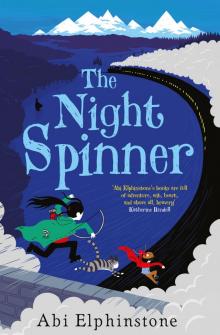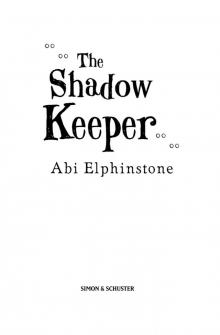- Home
- Abi Elphinstone
Zeb Bolt and the Ember Scroll Page 2
Zeb Bolt and the Ember Scroll Read online
Page 2
“A piano,” he breathed.
You see, Zeb had not been brewing poison or shaking up cans of graffiti paint inside his bedroom on Rightangle Row. He had been teaching himself to play the keyboard he’d found under the bed there. Music, it turned out, was the one thing that could blot out everything else for Zeb. As soon as the first few notes of a song sounded, the rest of the world fell away. And while music didn’t seem to be a priority for the Tank, Zeb had watched an episode where the survival expert fashioned a rescue horn out of an ox’s thighbone, so he decided it must be all right to play a few sonatas from time to time.
Zeb gazed at the grand piano, sleek and black, as if it had been cut from midnight. And suddenly he forgot all about Outbursts and disappointing foster homes. He heaved the window up until there was space enough to climb through. Then, throwing one last look down Crook’s End to check that he hadn’t been followed, he squeezed himself into the theater and closed the window behind him.
It was absolutely silent inside, and Zeb winced as his footsteps bit into the quiet. But he made his way past the stalls, beneath the chandelier, and toward the stage. In the wings and scattered in moonlight, Zeb could see old set designs piled up on top of each other—mountains, palaces, and jungle trees—as well as heaps of abandoned props. Birdcages stacked up beside lamps, parasols left on sagging armchairs, and typewriters plonked on old trunks. Zeb was relieved that he would be spending the night curled up in an armchair rather than huddled under the tarp outside. Now, though, he wanted to play the piano—while the moonlight was at its brightest and everyone else was asleep, so that whatever he played would go unheard and he wouldn’t be caught.
He sat on the stool before the piano. The keys were coated in dust, and Zeb wondered how long the instrument had stood there unused. He blew the dust away, and the chandelier glittered mischievously above, as if inviting him to play. Perhaps if Zeb had known that the real danger that night didn’t lie out on the street but under it, he would have gotten up there and then and left Crook’s End. But Zeb did not know that a harpy was waiting for him beneath the theater. And so he played the tune he loved most, the tune he chose whenever he felt afraid and alone, because it carried him back to a memory of long, long ago. He played it softly, slowly, but even as the first few notes tiptoed out into the empty theater, Zeb felt a sense of calm settle inside him.
He forgot about the Orderly-Queues. He forgot about eating lunch alone in the school cafeteria. He forgot about nights spent crying under his duvet. Instead he thought about the mountains, palaces, and trees in the wings of the theater, and as he played, he imagined they were real and that he was walking among them in a land far away. On and on Zeb played, unaware that deep underground, below this very piano, Morg’s dark magic was stirring.
Chapter 2
The cookies didn’t last long. In fact, by the next morning, Zeb had eaten all twenty-four of them and polished off his bottle of water. But a quick snoop around the theater showed him there was a dressing room with a sink, running water, and a working toilet, and several packets of jelly beans in a box in the foyer. Not enough to throw a dinner party, but enough to keep an eleven-year-old going for a day or two.
Zeb still wasn’t entirely sure what his plan was. He just knew that inside this theater he had a bed, a piano, and lots of places to hide if someone came looking or a bout of explosive crying took hold. So, until the jelly beans ran out, there was really no need to leave.
He rooted through the props and placed all the slightly scary ones in a bathtub he’d spotted at the back of the theater. Waking in the middle of the night to find himself face-to-face with a witch mask wedged down the side of his armchair was not an experience he wanted to repeat. He spent a large chunk of the day in front of a dressing room mirror, flexing his undersized biceps in preparation for intruders. Mostly, though, Zeb found himself counting down until moonrise and the silvery hours that followed when the rest of the world had gone to sleep. Then it would just be him and the grand piano, safe in the knowledge that nobody would hear.
Only somebody did hear.
Several streets away, there lived a young woman with fire-red hair called Fox Petty-Squabble. As an eleven-year-old, she had spent her days bickering with her twin brother, Fibber, but all that had changed after an adventure in the Unmapped Kingdom of Jungledrop, where they had banished Morg down a well and restored rain to our world. That was some time ago, and Fox was almost thirty now, but she could remember the glow-in-the-dark rainforest as if it were yesterday. And now that the world’s climate was spiraling out of control again, faster than any of the scientists had predicted, Fox lay awake wondering whether there might be trouble in the Unmapped Kingdoms once again.
Fox was a social worker now. She had dedicated her life to helping others. But she knew that if Morg was behind this latest climate emergency, she’d need to go back to the Unmapped Kingdoms to sort things out. The only snag was that like last time, she’d need a phoenix tear to get there. There were only five of these tears left, and who knew where they were? She and Fibber had only stumbled across one the first time because an old antiques collector called Casper Tock had thrust it into her palm.
That night, Fox listened to the sound of the piano, so faint that at first she thought she was imagining it. But it was there, just at the edge of her hearing—music so beautiful it was like listening to waves rolling. It had been the same the night before, too, as she lay in her bed struggling to sleep. So, who was sitting down to play the piano in the middle of the night?
She sat up, padded across the bedroom of her top floor flat, and pulled back the curtains. Was the music coming from Crook’s End? That would be impossible—no one lived there anymore. When she had visited the theater a few years ago, the week before it closed, she had most definitely seen a grand piano up onstage as part of the last production. Surely there was no one inside the Chandelier after all this time?
Now, most people would think twice about venturing into a boarded-up theater at night. But when you have faced cursed trees and demon monkeys, you find yourself blessed with more courage than most. So Fox bundled on some clothes and made her way out into the dark.
Zeb, meanwhile, was halfway through a piece of music he had composed the week before. It was low and brooding, inspired by an episode of The Tank, where he’d watched his hero hypnotize an elephant while simultaneously building a campfire. Zeb couldn’t read music. He’d never had lessons, and he’d always played the Orderly-Queues’ keyboard with headphones plugged in so that no one would poke their head round his door and tell him to be quiet. But he couldn’t help feeling that music was, rather curiously, in his bones. Melodies seemed to come to him far more easily than family and friends. Zeb had put his musical talent down to a strange stroke of luck, but there was more to it than that. Magic was at work here. And this magic knew that one day Zeb would need his secret talent to work a miracle and save the world.
Zeb closed his eyes as he played, lost in the rise and fall of the notes, but when he opened them, he shrieked. There was a woman with bright red hair standing in the foyer! Zeb hurtled offstage into the wings, grabbed a vicar’s robe from a pile of costumes, and threw it over his hoodie and jeans. Then he waited, crouched on the ground with his heart thudding, as the footsteps came nearer.
“I won’t hurt you,” the woman said. “I just want to talk.”
Zeb burrowed deeper into the vicar’s robe, instantly regretting it as a form of cover and cursing himself for playing the piano in the first place. The Tank would never have let a midnight concerto give him away.
“You’re good at the piano,” the woman said. “Really good.”
Zeb could tell she was close. He risked a peep out of the vicar’s robe and squeaked. The woman was on the stage now, and she was looking right at him. Zeb held her gaze and tried his best to look fierce. Being hard-core was exhausting, especially when all you wanted to do was burst into tears, but right now it was absolutely necessary. Zeb continued to gla
re at the woman. Would his biceps be up to the challenge if she got tricky?
“Why are you in here all alone in the middle of the night?” the woman asked.
Zeb pursed his lips and said nothing. Well-meaning members of the public often stepped in at critical points during his getaways, but they didn’t care what happened to him in the end—not really. Once they’d phoned the police and an officer had come round to collect him, he wasn’t their problem. But this woman didn’t reach for her phone. She knelt down on the stage in front of Zeb instead. And smiled.
“Do you enjoy playing the piano?” she asked.
To his horror, Zeb found himself nodding inside his robes. What was he doing? If you were on the run, you didn’t engage in chitchat about music! He did some jaw clenching and a small grunt to make up for it.
The woman kept talking, and Zeb noticed her voice was gentle, quite unlike the clipped tones of Joyce and Gerald Orderly-Queue and the dull drone of Derek Dunce.
“I’m hopeless with musical instruments,” she said. “But I did go to an orchestral concert in Germany a few years ago, in a little village called Mizzlegurg with a dear old friend called Casper Tock, and the pianist there was quite something.” She paused. “Almost as good as you, in fact. She was from Nigeria—and they say when she plays, the clouds part.”
Zeb was unsure how to respond. An Outburst didn’t seem to be brewing anymore, but he didn’t exactly want to get himself caught up in a conversation either. Which is why he was surprised to hear himself say, “You heard Alaba Abadaki?”
The woman’s face lit up. “Yes! That was her name!”
Zeb had heard the famous pianist a number of times on the radio in his bedroom, and he could only imagine how brilliant she must have been to see. But he tried not to dwell on this thought—he had a conversation to shut down and a visitor to dispose of before his getaway got completely out of control.
“I’m Fox,” the woman said.
Zeb stiffened inside his robe. This did not sound like the end of a conversation. Why wasn’t this woman dragging him off to the police station?
And then Fox said: “I’m a social worker, and I live nearby.”
Zeb narrowed his eyes. The last thing he needed was a social worker foiling his escape, though she did seem very different from Derek Dunce. Her voice was softer, her eyes were brighter, and she didn’t fill the silences with pointless suggestions.
“I want to help you,” Fox said.
Zeb glowered at her. “I don’t need help. From anybody.”
Fox held up a half-empty packet of jelly beans and smiled. “Looks like you’re almost out of these.”
Zeb snatched the packet from her and shoved it under his robe.
“Listen,” Fox said. “Why don’t I take you out for some proper food? There are always a couple of diners open through the night. You can order anything you want: a burger, a plate of fries, a milkshake—whatever. And we can have a little chat.”
Zeb’s stomach growled at the mention of burgers. But the “little chat” did not sound good.
“I’m staying here.” Zeb flapped his robe dramatically to make his point. “I’m not going out for food or back to a foster home ever again.”
Fox looked at the boy sadly. She and her brother had been miserable and lonely as children. She knew what it was to feel unloved by grown-ups and she recognized it before her now.
“I can’t force you to come with me, Zebedee.”
Zeb flinched. “How do you know my name?”
Fox nodded toward the foyer. “It’s inked onto your rucksack.”
Zeb picked at his robe. The Tank could have warned him that taking named belongings out into the wild might be problematic.
“Go away,” he muttered after a while, even though the thought of how he was going to find food once the jelly beans ran out was starting to make him feel uneasy.
He expected Fox to stand up, whip out her phone, and call in reinforcements. But she understood that children were complicated creatures, and though she knew she ought to walk Zeb to the police station, she sensed he wasn’t the sort of child who was ready to give in just yet.
“Life won’t always be this hard,” Fox said softly.
Zeb blinked. He wasn’t used to tenderness, and Fox had caught him off guard. Zeb tried to steel himself, but it was too late. Her kindness had triggered an Outburst, and though he swallowed and swallowed to force down the lump in his throat, Zeb had to face facts: The tears were coming whether he liked it or not.
“One day, things will be better,” Fox went on. “Brighter.” Zeb rubbed the first tear away, and Fox leaned in a little closer. “One day you will realize that you matter.”
A second tear dribbled down Zeb’s face and soon his cheeks were streaked. He brushed the tears away, but more fell, so he buried himself under his robe, where it was safe, and sobbed. And the more he sobbed, the angrier he felt. He had been doing just fine until Fox showed up. Now he was having an Outburst, and the whole getaway was lurching to a close. Zeb waited, again, for Fox to haul him up and insist he come along to the police station with her. But she didn’t, and for a wild moment Zeb found himself wondering whether perhaps she really might be different from all the other grown-ups. He stamped the thought out as quickly as it had come—Outbursts always played havoc with his emotions.
“I’m going to hurry back to my flat and get my purse,” Fox said. “Then when I come back, maybe we can have another think about that milkshake?”
Zeb sniffed. As far as he could tell, he had three options: wait here under the vicar’s robe in the unlikely event that Fox kept her promise and came back for him; run off once again into the night; or sail out of New York on a raft built from theater props like the Tank would do. Zeb wiped his nose, forced the Outburst away, and tried to make a decision. It was pointless, really, because the harpy underground had been listening to everything. She had her own agenda—and it had nothing whatsoever to do with what Zeb wanted.
Fox stood up. “I’m coming back for you. I promise. Just stay here until then.”
She turned and hurried out of the theater. And as soon as she was gone, the whispers started.
Chapter 3
Tucked under the vicar’s robe, Zeb didn’t hear the whispers at first. He was too busy trying to work out what he thought about Fox. But as he shrugged off his costume, he heard faint scratches of words coming from the direction of the piano.
“F-Fox?” Zeb called nervously. “Is that you?”
There was a brief silence. The chandelier sparkled in the moonlight. Then the whispers resumed, a little louder and more urgent than before. Zeb frowned—they seemed to be coming from inside the piano.
He eyed the instrument from the wings of the stage. This was not good. His survival training hadn’t factored in the possibility of whispering pianos. The whispers grew louder, and Zeb realized they were saying one word over and over again, which slid down his spine like ice.
“Zebedee. Zebedee. Zebedee.”
Zeb let out a terrified moan. Why was there a voice inside the piano calling his name? He’d looked inside earlier when blowing dust off the strings and there hadn’t been a person hiding there. But more than that, this voice didn’t sound as if it belonged to Zeb’s world—it was the kind of voice rust might have if it could speak, and yet there was an edge to it that sounded somehow female. Zeb gulped. Was the theater haunted? Was this a ghost lurking inside the piano?
He tried to move. Perhaps running off again was the safest bet, because now that the Outburst had passed, he felt fairly sure it was madness to think he could rely on Fox. What would make her any different from the other grown-ups he’d met? All that talk of burgers and milkshakes was probably just a trick to get him out of the theater. For all he knew, Fox could be at the police station right this moment turning him in. But when Zeb made to move, his legs wouldn’t budge. Fear held him just where he was. Right where Morg, the whispering harpy, wanted him to be.
“I can summo
n anything you want,” the voice was saying now. “A getaway plane, riches galore. A place of your own miles away from anybody else so you never need to bother with other people again. With my magic, anything is possible.”
Zeb was still too frightened to move. This ghost, or whatever it was, seemed to know things about him. Had it been listening in on his conversation with Fox? But alongside Zeb’s fear, curiosity emerged. Nobody had ever promised him getaway planes, riches, and remote hideaways before. Zeb shook himself. He had watched close to a hundred episodes of The Tank and not once had his hero mentioned magic. But despite knowing it didn’t exist, Zeb found himself imagining the possibilities of a future built with magic: a palace in the Himalayas; a castle in some remote forest in Finland; a fortress in Outer Mongolia… Zeb blinked to stop himself getting completely carried away.
But the voice went on, laying its promises at Zeb’s lonely feet. “You could have a castle with a hundred floors and a grand piano in every room. You could have rooftop swimming pools and a private cinema. You could be so filthy rich you would never want for anything.”
Zeb steeled himself again. Getting sidetracked by something as ridiculous as magic was bound to end in disaster. He tried to focus on the voice itself instead. Was it actually coming from the piano, or was it all in his head? He stood up on shaking legs and made his way toward the instrument. Holding his breath, he peered inside. No ghost looked up at him, no hideous specter leapt out. There was nothing inside the piano, just the strings and hammers—and the voice.
“I am not of your world, Zebedee. I am a creature trapped just beyond it because the journey here has taken nearly all of my strength. With your help, I will be able to do extraordinary things. Magical things that could change your life.”

 Everdark
Everdark Zeb Bolt and the Ember Scroll
Zeb Bolt and the Ember Scroll Rumblestar
Rumblestar Jungledrop
Jungledrop The Night Spinner
The Night Spinner Soul Splinter
Soul Splinter Winter Magic
Winter Magic The Dreamsnatcher
The Dreamsnatcher Sky Song
Sky Song